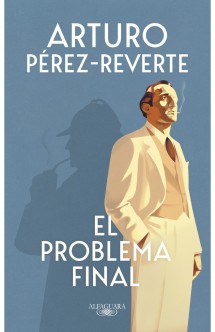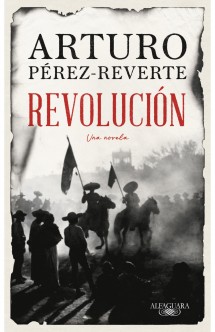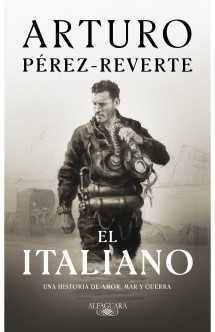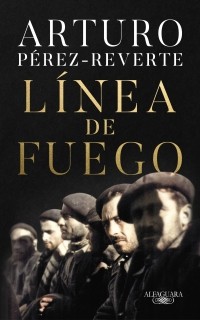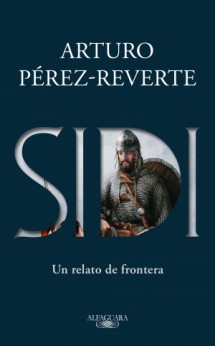Prensa > Críticas en otras lenguas
Críticas en otras lenguas
Críticas publicadas en otros idiomas.
La crítica anglosajona ensalza las aventuras de Alatriste
13/6/2007
«Arturo Pérez-Reverte confirma de nuevo su lugar como gran maestro del
thriller histórico en esta magistral novela que conjuga secretos
sepultados bajos las cenizas de un pasado funesto que no quiere pasar,
reflexiones filosóficas y una endiablada intriga. ¡Apasionante!»
La crítica anglosajona ha recibido con numerosos elogios las ediciones
en inglés de las tres primeras entregas de la saga de Arturo
Pérez-Reverte, El
capitán Alatriste, Limpieza
de sangre y El
sol de Breda. En el siguiente artículo reproducimos fragmentos
de las principales críticas aparecidas.
‘Arturo Pérez-Reverte['s] Alatriste books have sold more than five
million copies worldwide'. Sunday Telegraph
‘A thinking man's adventure novel, where sword fights and tales of
derring-do are interwoven with wonderful passages of poetry and gems of
historical and cultural information'. The Times
‘Pérez-Reverte is very good at evoking the atmosphere of a teeming,
corrupt and jaded Madrid, unhappily enduring the reign of Philip the
Fourth in the last decades of Spain's imperial glory. He is superb at
the precisely choreographed sword fights'. Daily Telegraph
‘Equipped with a quick-witted, charismatic hero and much to provoke
and goad him, Mr Pérez-Reverte has the makings of a flamboyantly
entertaining series. Captain Alatriste ends with a wicked flourish, an
evil laugh and a strong likelihood that the best is yet to come'. New
York Times
‘From the 19th century on, readers searching for adventure have always
loved tales of flashing steel, of duels to the death on moonlit
parapets, of swashbucklers with ironic smiles and perfect manners . . .
Arturo Pérez-Reverte now adds Captain Alatriste'. Washington Post
‘Splendidly paced and filled with a breathtaking but not overwhelming
sense of the history and spirit of the age, this is popular
entertainment at its best: the characters have weight and depth, the
dialogue illuminates the action as it furthers the story and the
film-worthy plot is believable throughout'. Publishers Weekly
‘Pérez-Reverte's moody, wounded semi-hero . . . is a whole-cloth
invention out of 17th-century Madrid that has led to a 21st-century
literary phenomenon . . . introduces a charismatic, complicated leading
man . . . the clash and dash are thrilling; the swordplay is a bonus'. Entertainment
Weekly
‘Purity of Blood is the latest in a line of utterly
unputdownable novels by Arturo Pérez-Reverte in which he has finessed a
storytelling tradition stretching back to his great literary
predecessors
. . . This latest book is brimming with all the panache of previous
novels by the writer and with even more confidence . . . this is
glorious stuff, the kind of book to remind us how exhilarating
old-fashioned adventure writing can be'. Daily Express
‘Captivating . . . This is fiction that can be enjoyed on several
levels: as a poignant evocation of doomed imperial splendour; as a
clever literary game in which historical and invented figures rub
shoulders; as a parable about racism past and present; or as a simple
tale of swashbuckling derring-do'. Sunday Times
‘Intelligent, exciting historical swashbucklers . . . With writing
rich in the minutiae of 17th-century Madrid life and interspersed with
poetry, the author is clearly having a ball and the reader can join with
him'. Waterstone's Books Quarterly
‘Rich in historical detail and sardonic observations'. Publishers
Weekly
‘The plot moves quickly . . . Pérez-Reverte is . . . engaged with the
theme of religious fanaticism, providing vivid depictions of the
Inquisition and its public theatre of auto-de-fe'. Times Literary
Supplement
‘The book is full of vivid scenes bringing to life 17th-century
Spain'. Sunday Telegraph
‘A worthy successor to Zorro and Scaramouche . . . he is knowledgeable
and convincing in his evocation of those earlier, darker times . . .
His novels are fine examples of historical writing for a mass audience,
and that is his most important achievement' Herald
